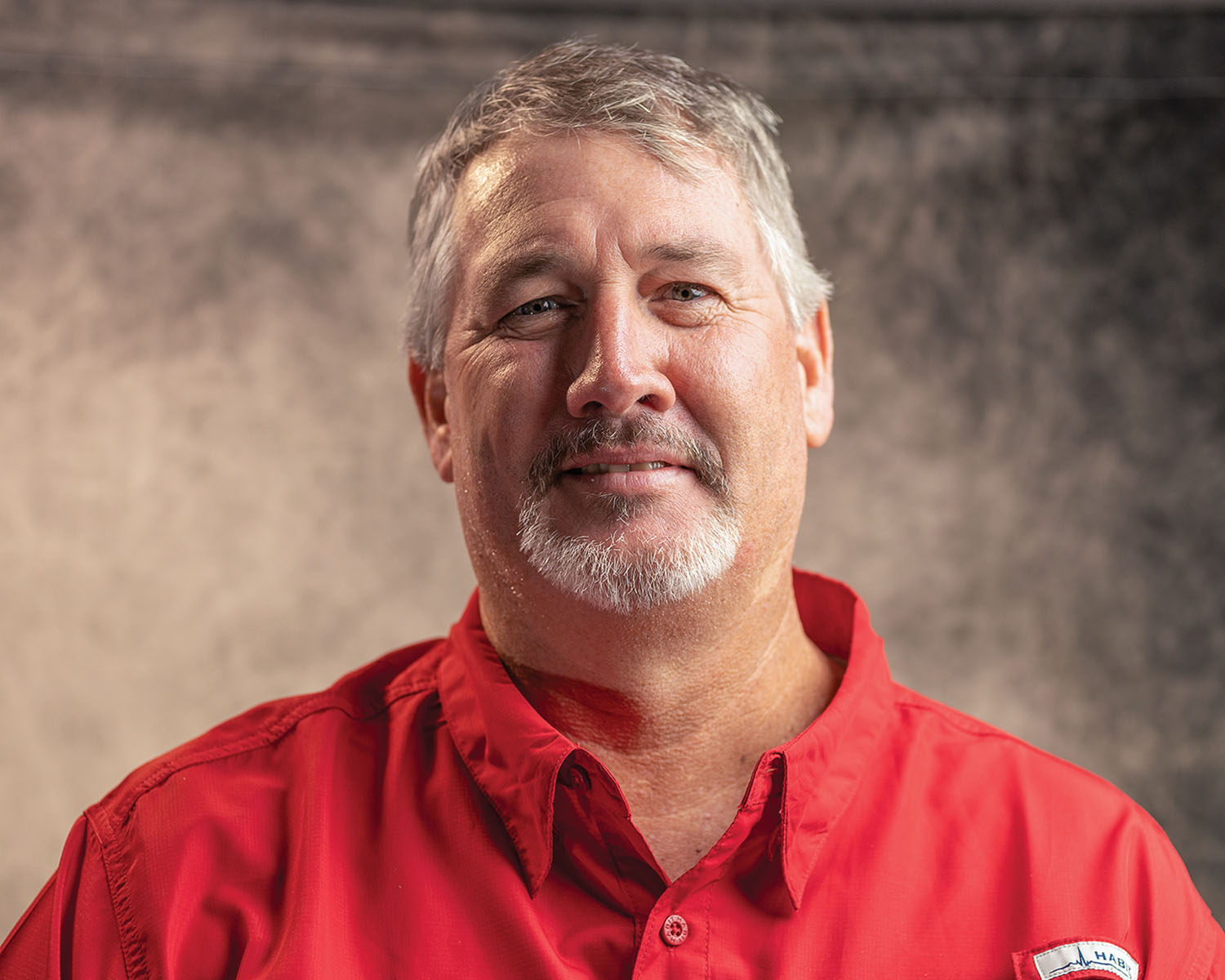Capt. Corey Moorer has always been interested in spending time on the water.
As a youth, he fished, went shrimping with his dad, water skied and even had a surfboard.
“I just always kind of liked the water, but I didn’t know what I wanted to do on it,” he said.
When he graduated high school in 1987, Moorer, 54, of Bay Minette, Ala., put in an application for a dredging company.
Disappointed when he didn’t immediately hear back from the company, he decided to take another path that he thought would allow time on the water, joining the Navy. Instead, he was assigned to a helicopter squadron.
When he got back from boot camp, there was a letter on his chest of drawers that it turned out his mother had hidden from him. He had been offered an interview at the dredging company, but she hadn’t wanted him to know about it, fearing for his military career.
It wasn’t until Moorer served four years in the Navy that he decided to once again think about a civilian career on the water. Orgulf, then a division of Midland Enterprises, was advertising for a deckhand. Moorer responded to the advertisement and this time got the job.
He started out working on the Gulf Coast on the Gulf Intracoastal Waterway, spending a lot of time between Houston, Texas, and Pensacola, Fla.
“We were in Mobile one day, and it just happened that I saw a friend from home,” he said. The friend was working on red-flag tank barges and making more pay, and that sounded good to Moorer at the time. He transferred to Hollywood Marine in 1995 and within six months became a tankerman. Four years later, in 1999, he was in the wheelhouse.
At first working as a relief captain, Moorer ran the Black Warrior-Tombigbee River primarily, from Mobile to Tuscaloosa. Most of the time, he ran tows of crude oil, VGOs (vacuum gas oils) and asphalt. After a while, he said, it began to feel repetitive.
“I always wanted to get out on the big river,” he said.
One day he got a call from the same friend who had convinced him to start working in the tank barge business. The friend was now at Florida Marine, and he said he could help Moorer if he wanted to see more of the river system.
“That’s how I got my first chance of running above Baton Rouge,” he said.
From 2005 to 2007, Moorer piloted tows as far north as St. Paul on the Upper Mississippi, Pittsburgh on the Ohio and Joliet on the Illinois.
“I was jumping around on their boats, just getting as much training as I could,” he said.
That jumping around ended in March 2007, with the opportunity to come to Blessey Marine Services. Moorer hired in as a pilot but made relief captain within a year and captain in 2012. He hasn’t looked back.
With the new job came added responsibility, not just for himself but for the equipment and the lives of the people working for him and even the surrounding environment.
Moorer thrived on it.
As captain of the mv. Pat Voss, a 3,200 hp., twin-screw vessel, Moorer said he has things just as he likes, running wherever he is needed.
“They’re that go-anywhere boat, and I kind of like those,” he said.
He discovered he also likes helping those who are new to the industry learn about what it takes to be a good deckhand. Moorer, a longtime fan of University of Alabama football, sees himself as a coach.
“I’m here for help, and I never would steer anybody wrong,” he said. He added, “I can’t ask for a better crew.”
He encourages those working for him to learn from as many people as they can and not to let personality differences stop them from taking in important information. He also insists on both safety and cleanliness.
“I know what the office expects out of me, and I expect each individual to know his job,” he said.
He thinks crewmembers should learn the right way to complete their tasks from the beginning, as it’s harder to unlearn bad habits, and he expects each person on his crew to be accountable for their actions, but he said he’s also big on treating every person with respect.
“I always said a great deckhand will make an awesome captain,” he said, indicating that a willingness to work hard and learn goes a long way in the profession.
Outside of work, Moorer likes to spend time with his wife of seven years, Wanza, his two sons and two daughters and now also grandson Jaxon, 7, whom he likes to take fishing.
He and Wanza also have both a bay boat and a bass boat.
“My wife loves the water, too,” he said. “She’ll sit and ride all day long.”
He says he keeps himself centered by going to church when he’s home and, when on the boat, having a cup of coffee over Facetime with Wanza and reading their daily devotional together.
“You’ve got to have God first in your life,” he said.
He also likes taking pictures of sunrises and sunsets and sending them to her, “just knowing the Creator painted that picture for us to enjoy,” he said. “We’re only on this earth for a speck, for a moment in time, and you’d better enjoy each day.”
Austin Brisco, Blessey Marine Services’ director of vessel operations, has worked with Moorer for close to 17 years.
“Corey excels as a captain simply because he cares,” he said. “Corey puts nothing less than 100 percent of his heart and industry knowledge into molding and mentoring every young mariner aboard his vessel.”
Brisco called Moorer “the true definition of a captain,” keeping in mind the legacy of the mariners and mentors before him.
“He operates his vessel flawlessly, making sure everyone goes back home safely to their families,” he said.
He also added that Moorer is a long-time member of Blessey Marine’s “captain’s club,” designed to honor and reward outstanding achievements and flawless operations leading to Blessey’s corporate “goal zero,” with no injuries and no spills outside primary containment.
Brisco concluded, “It is an absolute honor to have Capt. Moorer part of the Blessey Marine family.”




